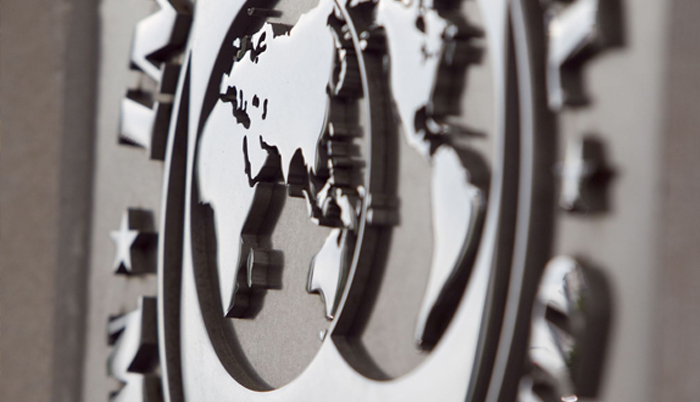![]() Home > World Business
Home > World Business
`Tax the Rich' Is IMF's Unlikely New Mantra in Fight With Trump

Photographer: Andrew Harrer/Bloomberg
![]() October 12th, 2017 | 09:50 AM |
October 12th, 2017 | 09:50 AM | ![]() 749 views
749 views
UNITED STATES OF AMERICA
The International Monetary Fund spent decades telling the world’s governments how to run their economies on an American-inspired blueprint that became known as the Washington Consensus.
There wasn’t much consensus between the Fund and the White House on Wednesday, as they got embroiled in an unusually public disagreement over President Donald Trump’s tax plans.
The flashpoint was a new IMF paper arguing that developed nations can share prosperity more evenly, without sacrificing growth, by shifting the income-tax burden onto the rich. “Excessive inequality can erode social cohesion, lead to political polarization, and ultimately lower economic growth,” it said. The study came out as Trump was hitting the road to promote the biggest overhaul of America’s tax code in decades. The Tax Policy Center, echoing most independent analysts, says it will benefit high-earners most.
As it hosts the world’s financial leaders in Washington this week, the IMF has been celebrating a global recovery that’s gathering pace after the crash of 2008. But old economic certainties -- the kind that once prevailed at such gatherings -- are proving harder to put back together, and new concerns are forcing their way onto the agenda. The Fund has been rowing back from many of the policy prescriptions it used to hand out. Meanwhile, in developed economies, voters have expressed frustration with what they perceive to be the unequally shared fruits of free trade and open borders -- most dramatically in the U.S., by electing Trump.
‘$4,000 Raise’
The Trump administration took immediate aim at the Fund’s analysis.
A senior Treasury official disputed the conclusion that less-progressive tax rates could slow growth and make inequality worse. The official said Trump’s proposed cuts will leave the median American worker better off. The Treasury questioned the Fund’s forecasting too, suggesting the prediction for U.S. growth should have factored in Trump’s tax plans, and been higher as a result.
The president’s proposals include lower charges on corporations, and a cut in the top rate of income taxes -- though Congress will be given an option to make the wealthiest Americans pay more. In a major speech on his plans in Pennsylvania late on Wednesday, Trump said the change in corporate taxes will deliver a $4,000 pay raise for the typical household.
Trump campaigned on a pledge to stand up for workers in regions hurt by globalization, and he’s argued that slashing the corporate tax rate will boost productivity, employment and wages.
Cohn vs Bannon
But the proposals have split the Republican coalition that helped elect him. Gary Cohn, the president’s chief economic adviser, is among the plan’s main architects. The former Goldman Sachs executive called the chance to work on tax reform with Trump a “once-in-a-lifetime opportunity.”
Steve Bannon, who helped Trump’s election campaign tap into populist unrest, has backed a higher rate for the rich. Bannon is gone from the White House, ousted after a few months as an adviser there, but his continued sway over the party was apparent last month when his nominee defeated a Trump-endorsed candidate in Senate primaries in Alabama.
Trump’s a real-estate billionaire, and while he took the occasional pot-shot at Wall Street, inequality wasn’t central to his electoral pitch. The presidential candidate who played that note loudest was Bernie Sanders. The Vermont senator railed against the outsized influence of the wealthy, in a campaign that took the self-proclaimed socialist much closer to the Democratic nomination than pundits had expected. Sanders also took regular shots at the kind of economic orthodoxies that the IMF once routinely endorsed.
But the Fund’s thinking has changed.
It’s suggested that capital controls have their uses. It’s acknowledged that austerity in Europe was based on assumptions about fiscal multipliers that turned out to be wrong. In a much-cited paper last year, it argued that the package of policies labeled as “neoliberalism” may have been “oversold.” On Wednesday, it said that re-directing resources for education and health-care from the rich to the poor can address gaps in social programs.
The shift may have brought the IMF more closely in line with many governments -- but not, evidently, with Trump’s. And that’s a potential problem for the Fund.
The U.S. was the driving force behind the IMF’s creation after World War II to oversee the international currency system. But Trump has expressed skepticism about institutions like NATO, which he sees as obsolete holdouts from that era -- and about globalization in general. His election left many analysts wondering what was in store for the IMF.
On Wednesday, after the tax dispute erupted, White House budget director Mick Mulvaney said the Fund was among the skeptics that are “heavily invested” in the failure of Trump’s tax plans. And the Treasury official said the IMF and its sister institution, the World Bank, should focus on using their resources effectively.
The biggest contributor to those resources is the U.S. government.
Source:
courtesy of BLOOMBERG
by Saleha Mohsin and Andrew Mayeda
If you have any stories or news that you would like to share with the global online community, please feel free to share it with us by contacting us directly at [email protected]